History > QUESTIONS & ANSWERS > US & GA History Exemption Exam (UGA) Already Passed (All)
US & GA History Exemption Exam (UGA) Already Passed
Document Content and Description Below
US & GA History Exemption Exam (UGA) Already Passed In what year was Georgia established? ✔✔1732 When did settlement take place in Savannah? ✔✔1733 How long was Georgia in existence before... there was a governor or governing body within the colony itself? ✔✔Two decades Who ruled Georgia in the beginning? ✔✔Board of Trustees Define: Board of Trustees ✔✔The governing body of Georgia in London England. King George signed a charter establishing the colony and creating its governing board What years is Georgia referred to as "Trustee Georgia"? ✔✔1732 - 1752 What were four things that were outlawed when Georgia was founded? ✔✔slavery, rum, lawyers, and Catholics Who was the impetus behind Georgia's founding? ✔✔James Edward Ogelthorpe Battle of Bloody Marsh ✔✔On St. Simons Island between the English and the Spanish. It was an attempt of the Spanish to invade Georgia Who from Georgia signed the Declaration of Independence? ✔✔Button Gwinnett, Lyman Hall, and George Walton Who from Georgia signed the US Constitution? ✔✔Abraham Baldwin and William Few Jr. Which state was Georgia to enter the Union when it ratified the Constitution in 1788? ✔✔Fourth What was the most serious military confrontation between British and American troops? ✔✔Siege of Savannah in 1779 Where was the capital moved to and from in 1779? ✔✔Savannah to Augusta Battle of Kettle Creek ✔✔Took place in Wilkes County Nancy Hart ✔✔a female patriot and spy credited with killing several Tories at her home When was the ban on slavery in Georgia lifted? ✔✔1752 Eli Whitney ✔✔inventor of the cotton gin Yazoo land fraud ✔✔1795, the sale of western land to four land companies after the governor and members of the General Assembly had been bribed / land companies bribed GA leaders to sell land cheaply; resulted in U.S. take-over of disputed land James Edward Ogelthorpe ✔✔The leader of English Parliament who founded the Georgia colony, in order to create an effective buffer from the Spanish and Spanish controlled Florida. University of Georgia ✔✔Founded in 1785, first university in the nation established by a state government Wesleyan College ✔✔Established in Macon in 1836, the first degree-granting women's college in the world Trail of Tears ✔✔The Cherokees forced exile from the states northewestern territory in 1838 - 1839. It became a symbol of the trauma and suffering all experienced What was Georgia referred to as by the 1860s? ✔✔"Empire State of the South" Which state was Georgia out of all the states to secede from the Union? ✔✔fifth Howell Cobb ✔✔in control of the Confederacy's organizing convention Thomas R. R. Cobb ✔✔primary author of the Confederate Constitution William T. Sherman ✔✔known for his military campaign "March to the Sea" in which he marched from Atlanta to Savannah for his final siege. His troops burned barns and houses, and destroyed the countryside. His march showed a shift in the belief that only military targets should be destroyed. Civilian centers could also be targets Reconstruction ✔✔the period after the Civil War in the United States when the southern states were reorganized and reintegrated into the Union Freedmen's Bureau ✔✔established by Congress to aid African Americans undergoing the transition from slavery to freedom in the aftermath of the Civil War Klu Klux Klan ✔✔Terrorist organization devoted to racial inequality, suffering and evil, established 1868 Governor James Jackson ✔✔Overturned the Yazoo Act; elected to First Congress; lost reelection Joseph Brown ✔✔Governor from Georgia who tried at times to keep his own troops apart from the Confederate forces and insisted on hoarding surplus supplies for his own state's militias. He believed that his state had seceded so that it didn't have to follow the dictates of a central government. Milledgeville ✔✔Georgia's fourth capital and seat of the state government during the Civil War Henry L. Benning ✔✔A jurist who became associate justice of the Supreme Court of Georgia in the 1850s. He then became a vocal advocate for secession and earned the rank of brigadier general during the Civil War Robert Toombs ✔✔A senator and extremist from Georgia who said that the South would never let the federal government be controlled by the Republican party and threatened secession. Rufus Bullock ✔✔He served as the Governor of Georgia from 1868 to 1871 during Reconstruction and was the first Republican governor of Georgia. After various allegations of scandal, in 1871 he was obliged by the Ku Klux Klan to resign the governorship. Tunis Campbell ✔✔Represented McIntosh County as a state senator and served as a justice of the peace.Insisted on equal representation of blacks in juries and otherwise championed their rights to the point of making himself an annoyance to the whites. Was sentenced to a year of hard labor for improper conduct. the crop-lien system ✔✔a way for farmers to get credit before the planting season by borrowing against the value for anticipated harvests ; guess how well this worked for farmers Populism ✔✔Farm-based movement of the late 1800s that arose mainly in the area from Texas to the Dakotas and grew into a joint effort between farmer and labor groups against big business and machine-based politics. The movement became a third party in the election of 1892. "New South" Crusade ✔✔Sought to diversify the Georgia economy; eventually led to the industrialization of the state. Jim Crow ✔✔The system of racial segregation in the South that was created in the late nineteenth century following the end of slavery. These laws written in the 1880s and 1890s mandated segregation in public facilities. W. E. B. Du Bois ✔✔American civil rights activist; wrote the Souls of Black Folk and demanded full racial equality; helped found the NAACP Rebecca Latimer Felton ✔✔Rebecca Latimer Felton She was a civic leader that supported women's suffrage and temperance as well as strongly disagree with the convict lease system. She was also the first woman to serve in the US Senate Leo Frank ✔✔Jewish factory manager in Atlanta who was convicted of murdering a female employee. A mob lynched him in his jail cell. County-unit System ✔✔County-unit System It gave each county or district a certain number of votes. The bigger the district, the more votes. This inacurately stated what people wanted and gave rural areas more votes, which did not represent what most people would prefer. Agricultural Adjustment Administration ✔✔Restricted agricultural production in the New Deal era by paying farmers to reduce crop area. Its purpose was to reduce crop surplus so as to effectively raise the value of crops, thereby giving farmers relative stability again. Herman Talmadge ✔✔GA governor; in reaction to Brown vs. BOE he declared that GA will 'not tolerate the mixing of races in public schools or any other tax supported instutions." Forcibly took over the Governor's mansion until it was officially announced he had lost the election. Martin Luther King, Jr. ✔✔U.S. Baptist minister and civil rights leader. A noted orator, he opposed discrimination against blacks by organizing nonviolent resistance and peaceful mass demonstrations. He was assassinated in Memphis, Tennessee. Nobel Peace Prize Winner(1964) 1996 Olympic Games ✔✔Put georgia on a national stage, and made Atlanta a world known city. Thirteenth Amendment ✔✔officially abolished and continues to prohibit slavery and involuntary servitude; 1864 Fourteenth Amendment ✔✔overruled Dred Scott(1857) granting blacks citizenship ; reinforced due process and equal rights; 1868 Fifteenth Amendment ✔✔explicitly grants right of citizens to vote regardless of race, color or having been enslaved (!) ; 1870 Ben Epps ✔✔father of aviation in the state Charles Lindbergh ✔✔acclaimed aviator William B. Hartsfield ✔✔established Hartsfield Airport, also later became mayor of Atlanta Brown vs. Board of Education ✔✔ruled that the "separate but equal" laws were unconstitutional Why did colonists come to the new world? ✔✔religious freedom, profit, adventure and more Iroquois League ✔✔... indentured servant ✔✔A poor person obligated to a fixed term of labor. "...it depended for labor in its early years mainly on white indentured servants.... Hernan Cortes ✔✔spanish conquerer Jamestown ✔✔settled and named after king James The Stono Rebellion ✔✔a band of slaves marching proclaiming Liberty in 1739. they marched over ten miles and killed between 20-25 whites William Penn ✔✔early Quaker who founded Pennsylvnia The Great Awakening ✔✔evangelical and revitalization movement that swept Protestant Europe and British America (esp American colonies) leaving a permanent impact on American Protestantism Mercantilism ✔✔economic theory and practice common in Europe from 16th to 18th century that promoted governmental regulation of a nations economy for the purpose of augmenting state power at the expense of rival national powers Thomas Paine ✔✔English-American political activist, author, political theorist and revolutionary. Wrote Common Sense that advocated for colonial Americas independence from Great Britain Alexander Hamilton ✔✔founding Father of the US, cheif staff to General Washington and one of the most influential interpreters and promoters of the Constitution, the founder of the nations financial system and the founder of the first american political party Federalist Papers ✔✔series of 85 papers written by Alexander Hamilton, James Madison, and John Jay promoting the ratification of the United States Constitution Northwest Ordinance ✔✔was an act of the Congress of the Confederation of the US, passed in 1787. the primary effect was the creation of the northwest territory (the first organized territory of the US Kentucky and Virginia resolves ✔✔political statements drafted in 1798 and 1799 in which kentucky and virginia legislatures took the position that federal alien and sedition acts were unconstitutional Louisiana Purchase ✔✔the acquisition by the USA in 1803 of Frances claim to the territory of Louisana Hartford Convention ✔✔series of meetings from dec 1814 to jan 1815 in hartford connecticut in which new england federalists met to discuss their grievances concerning the ongoing war of 1812 and the political problems arising from the federal gvts increasing power Dartmouth College Case ✔✔a landmark decision from the US supreme court dealing with the application of the contract clause of the US constitution to private corporations Frederick Douglass ✔✔african american social reformer, orator, writer and statesmen. escaped slavery and became the leader of the abolitionist movement Nullification Crisis ✔✔section criss during Jacksons presidency created by SC ordinance of nullification. Seneca Falls Convention ✔✔... Morrill Act of 1862 ✔✔... New York City Riots ✔✔... Jefferson Davis ✔✔... Andrew Johnson ✔✔... conscription ✔✔... Eugene v. Debs ✔✔... Battle of Wounded Knee ✔✔... Sherman Anti-Trust Act ✔✔... Booker T. Washington ✔✔... Free Silver ✔✔... Open Door Policy ✔✔... Calvin Coolidge ✔✔... Scopes Trial ✔✔... Father Charles Coughlin ✔✔... Tenneessee Valley Authority ✔✔... Lend-Lease Act ✔✔... Hiroshima ✔✔... Containment ✔✔... Cuban Missile Crisis ✔✔... Brown v. Board of Education ✔✔... Malcolm X ✔✔... John F. Kennedy ✔✔... Tet Offensive ✔✔... Affirmative Action ✔✔...California 1990s Moral Majority ✔✔... Reagan Revolution ✔✔... Operation Desert Storm ✔✔... Ross Perot ✔✔... NAFTA ✔✔... Ronald Reagan was referring to ________ when he spoke of the "Evil Empire." ✔✔the Soviet Union Which nation held fifty-eight hostages in their capital's American Embassy in 1979 and 1980? ✔✔Iran Martin Luther King, Jr. first came to national prominence during: ✔✔the Montgomery bus boycott of 1955 What happened at Kent State University on May 4, 1970? ✔✔National guardsmen fired into a group of protesting students. The Harlem Renaissance was: ✔✔an African-American literary and artistic movement. ________ found themselves forced into internment camps in the western U.S. during World War II ✔✔Japanese-Americans The most significant third political party of the late nineteenth century was the: ✔✔Populist Party Jim Crow laws were: ✔✔a method of imposing strict segregation in even the smallest aspects of society. During the Civil War, conscription was: ✔✔first instituted by the Confederacy. [Show More]
Last updated: 2 years ago
Preview 1 out of 17 pages
.png)
Buy this document to get the full access instantly
Instant Download Access after purchase
Buy NowInstant download
We Accept:

Also available in bundle (1)
.png)
UGA BUNDLED EXAMS QUESTIONS AND ANSWERS WITH VERIFIED SOLUTIONS (2022/2023) (ALREADY PASSED)
UGA BUNDLED EXAMS QUESTIONS AND ANSWERS WITH VERIFIED SOLUTIONS (2022/2023) (ALREADY PASSED)
By Nutmegs 2 years ago
$17
9
Reviews( 0 )
$10.00
Can't find what you want? Try our AI powered Search
Document information
Connected school, study & course
About the document
Uploaded On
Feb 12, 2023
Number of pages
17
Written in
Additional information
This document has been written for:
Uploaded
Feb 12, 2023
Downloads
0
Views
96


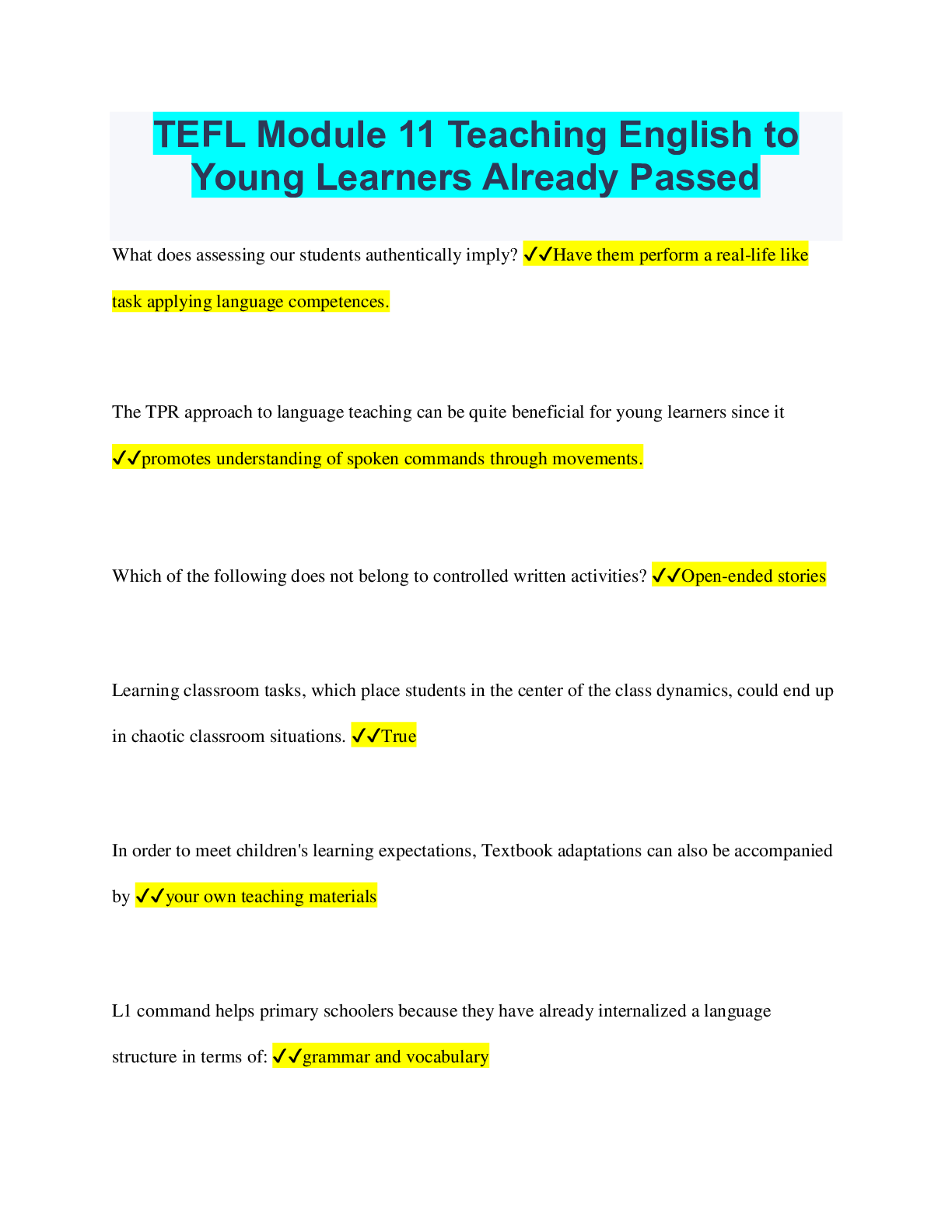
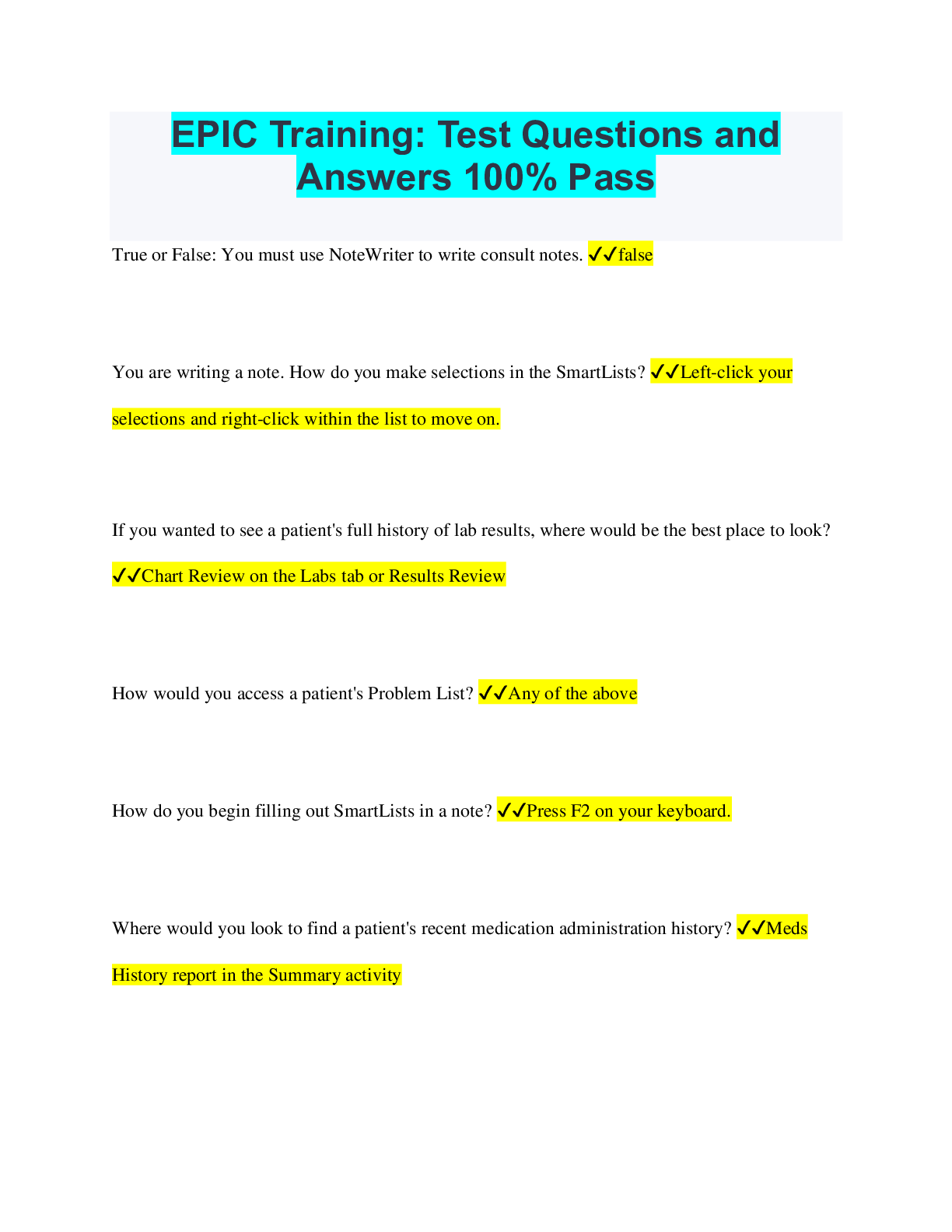
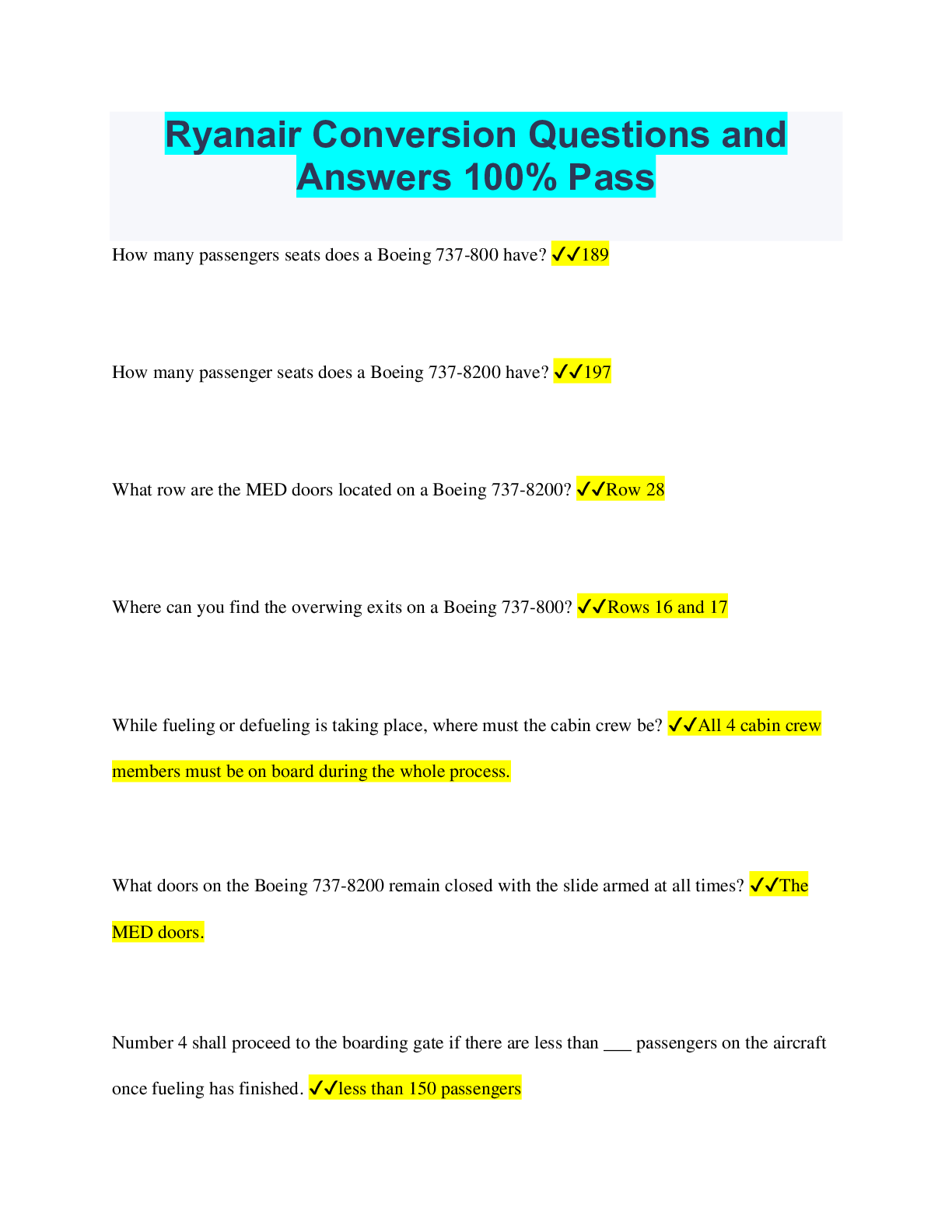
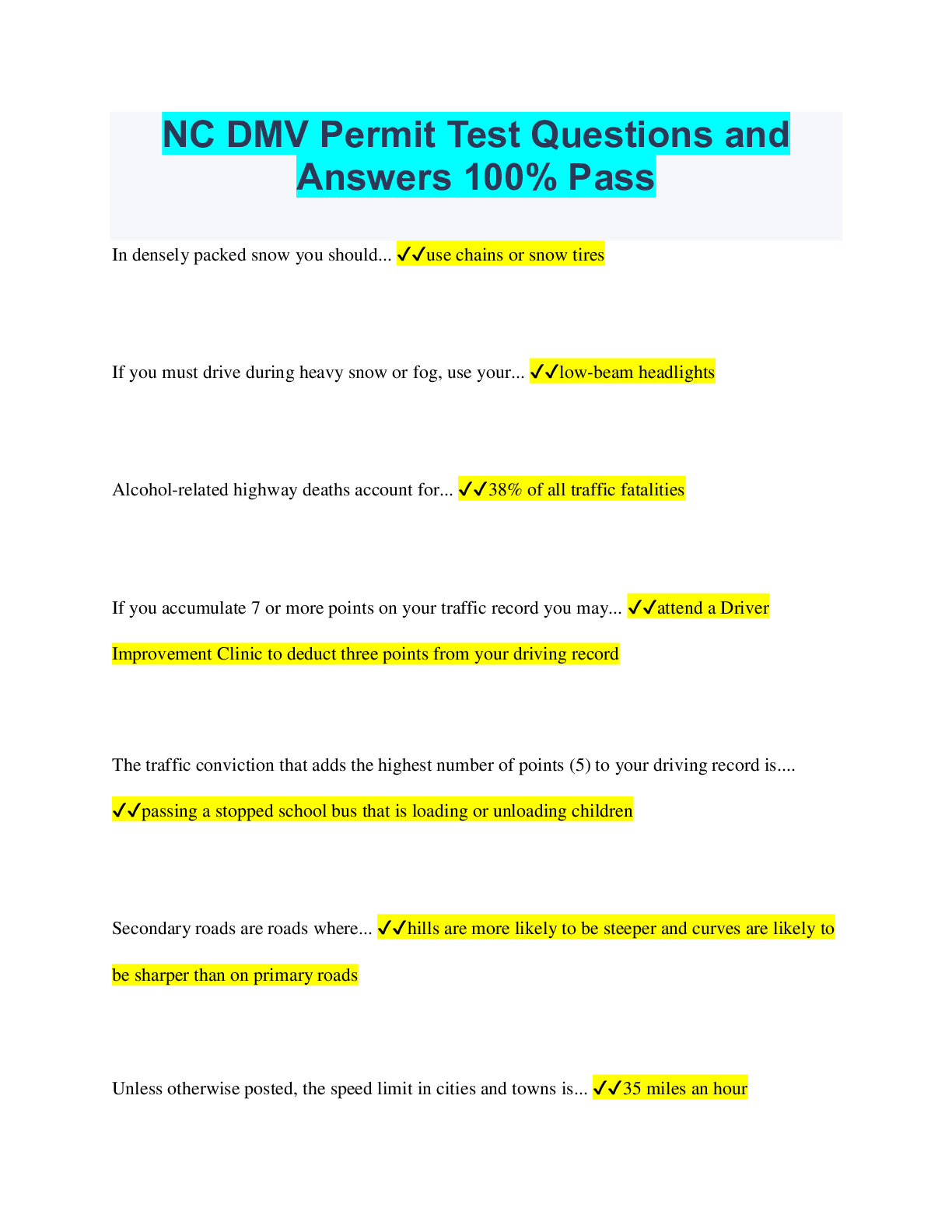
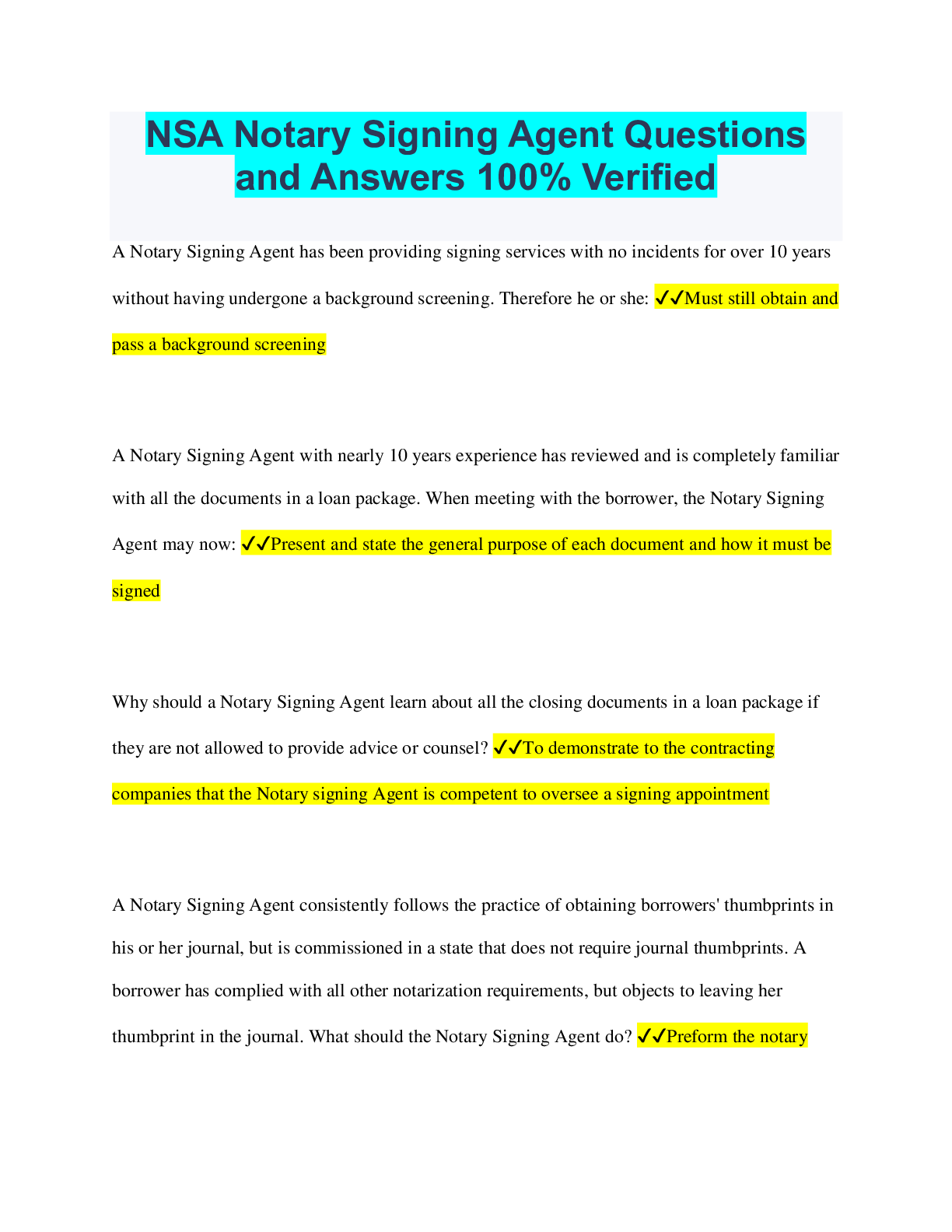
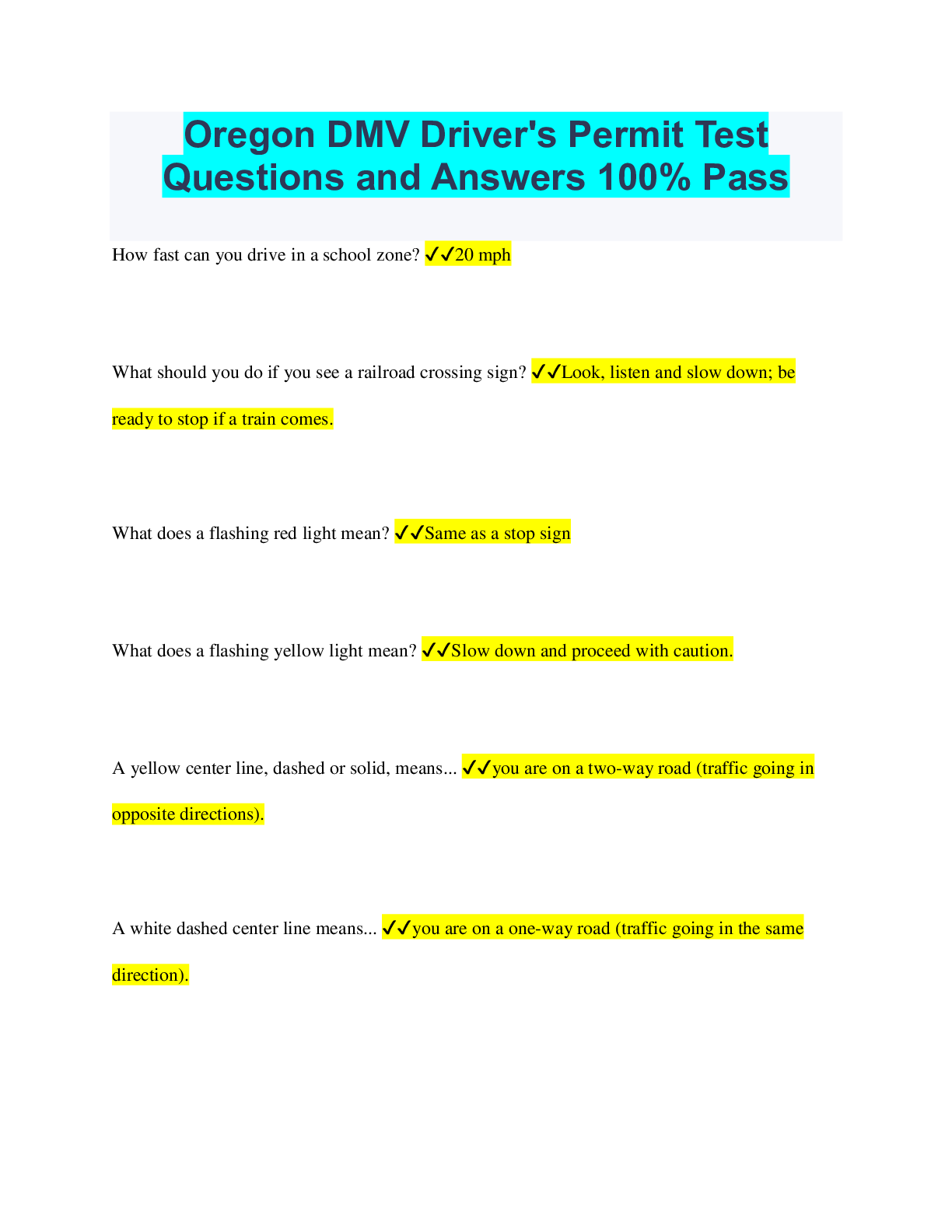
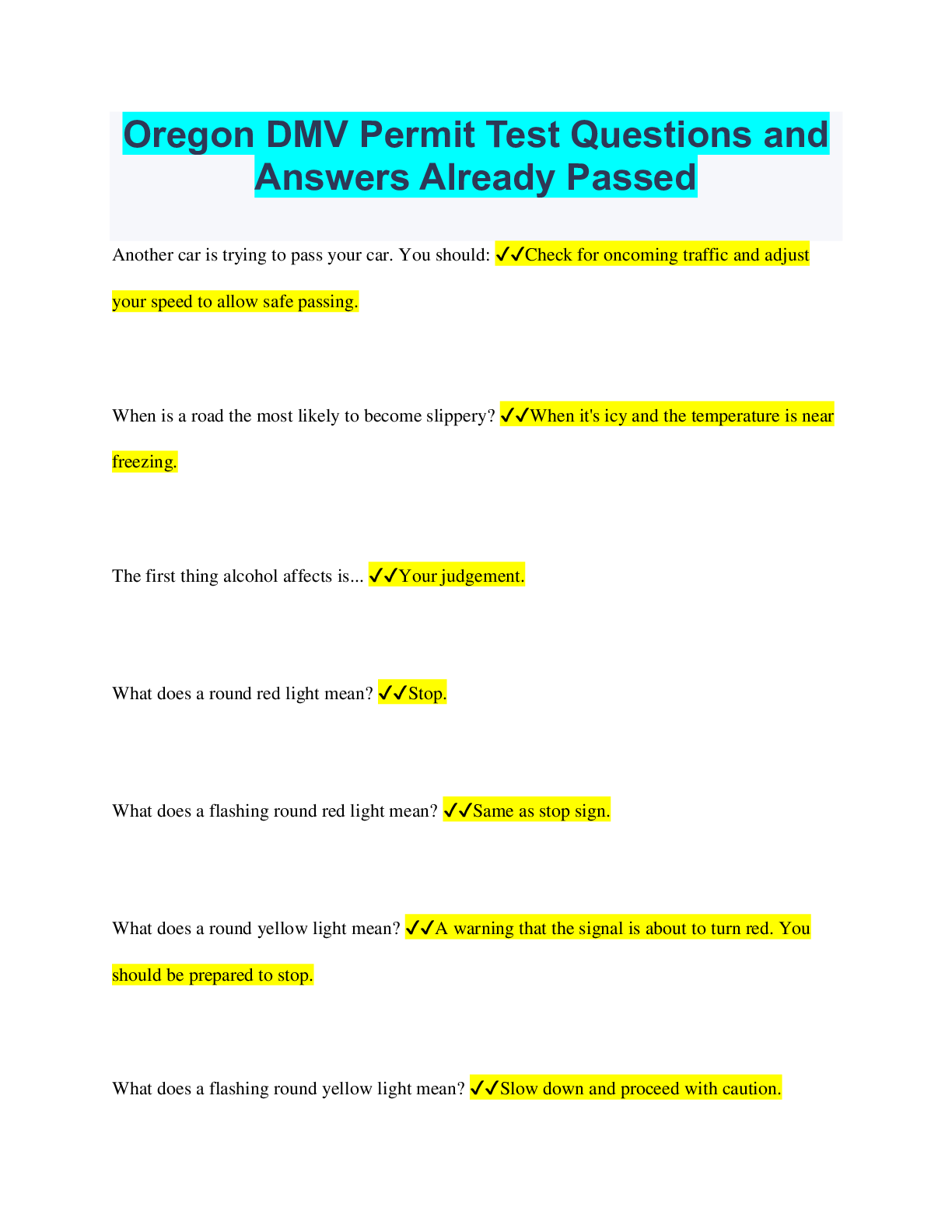
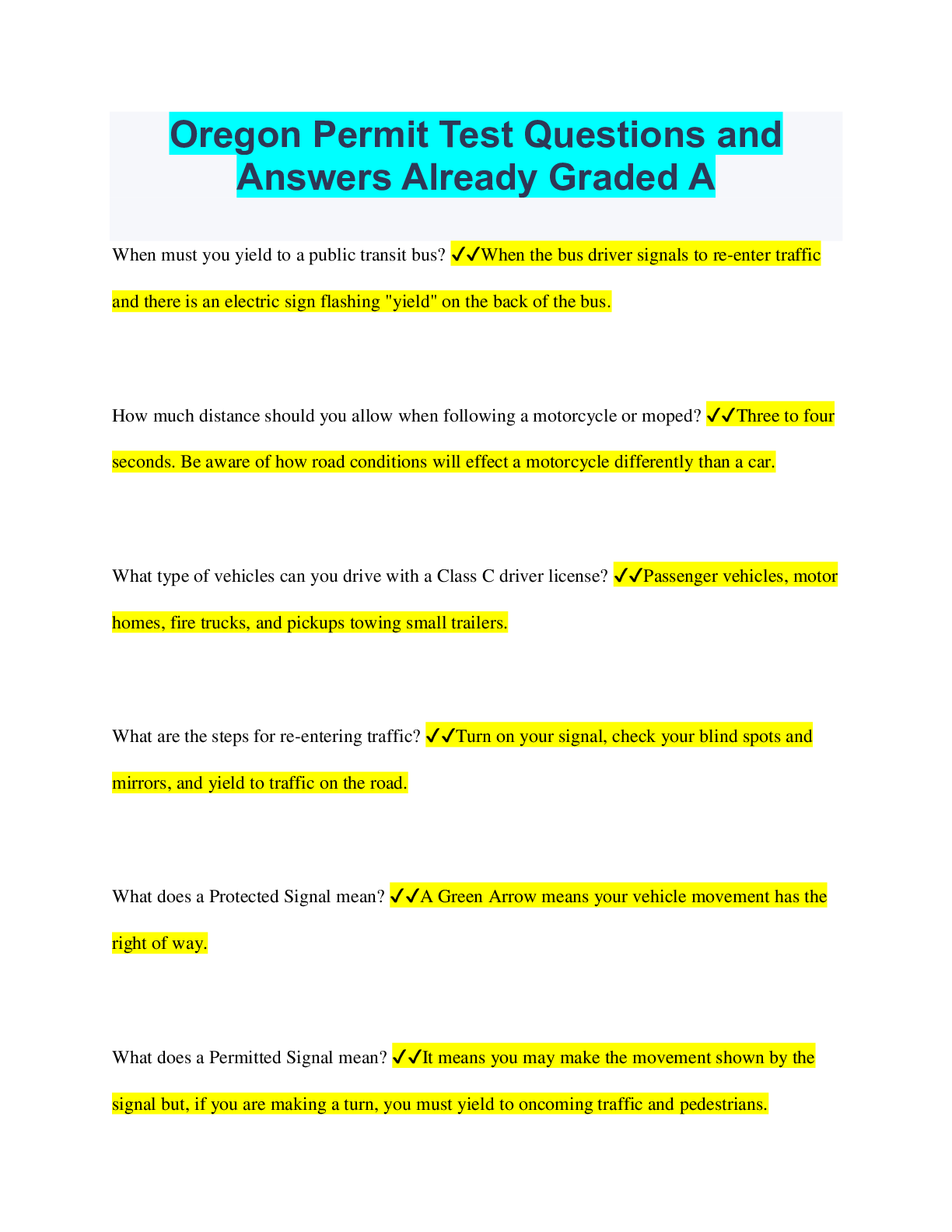
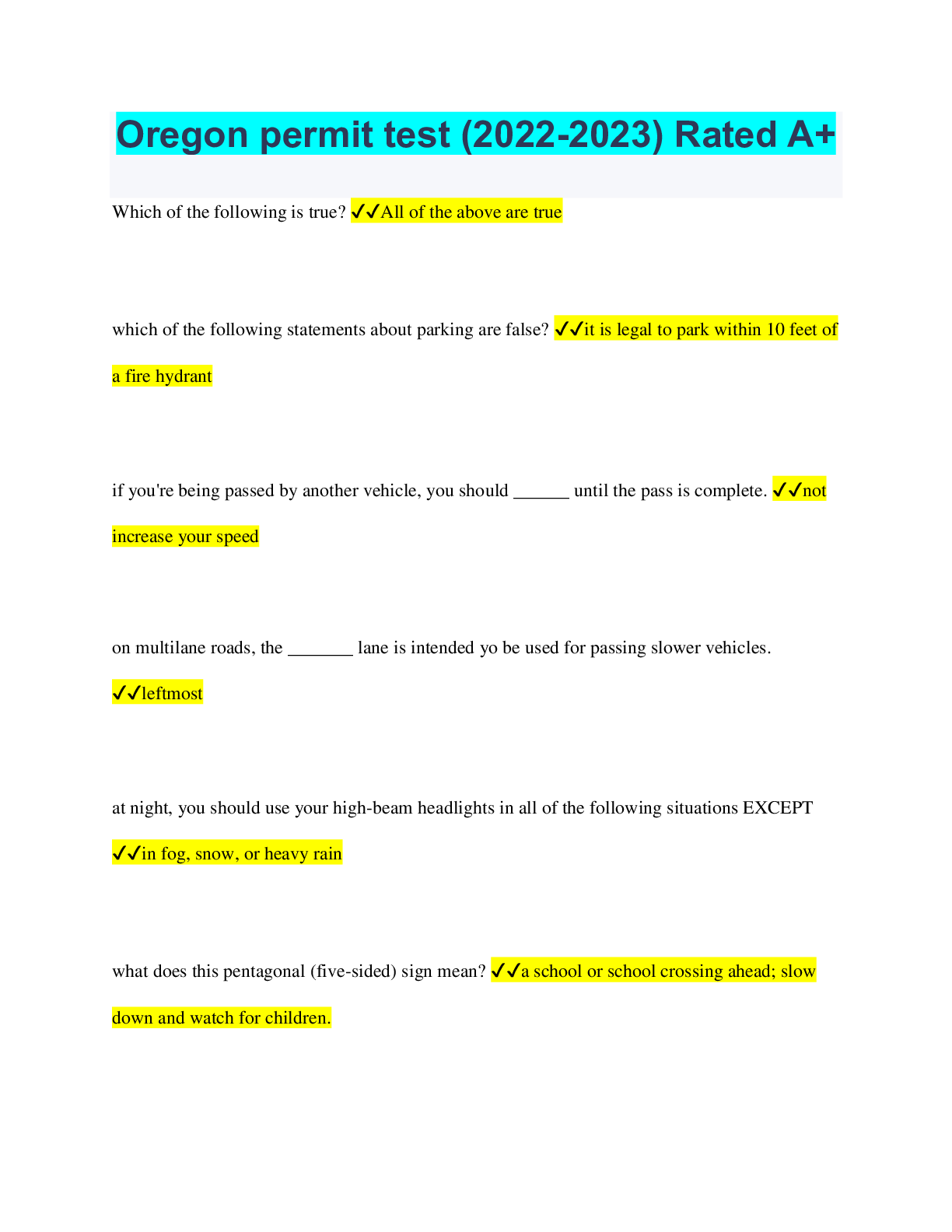
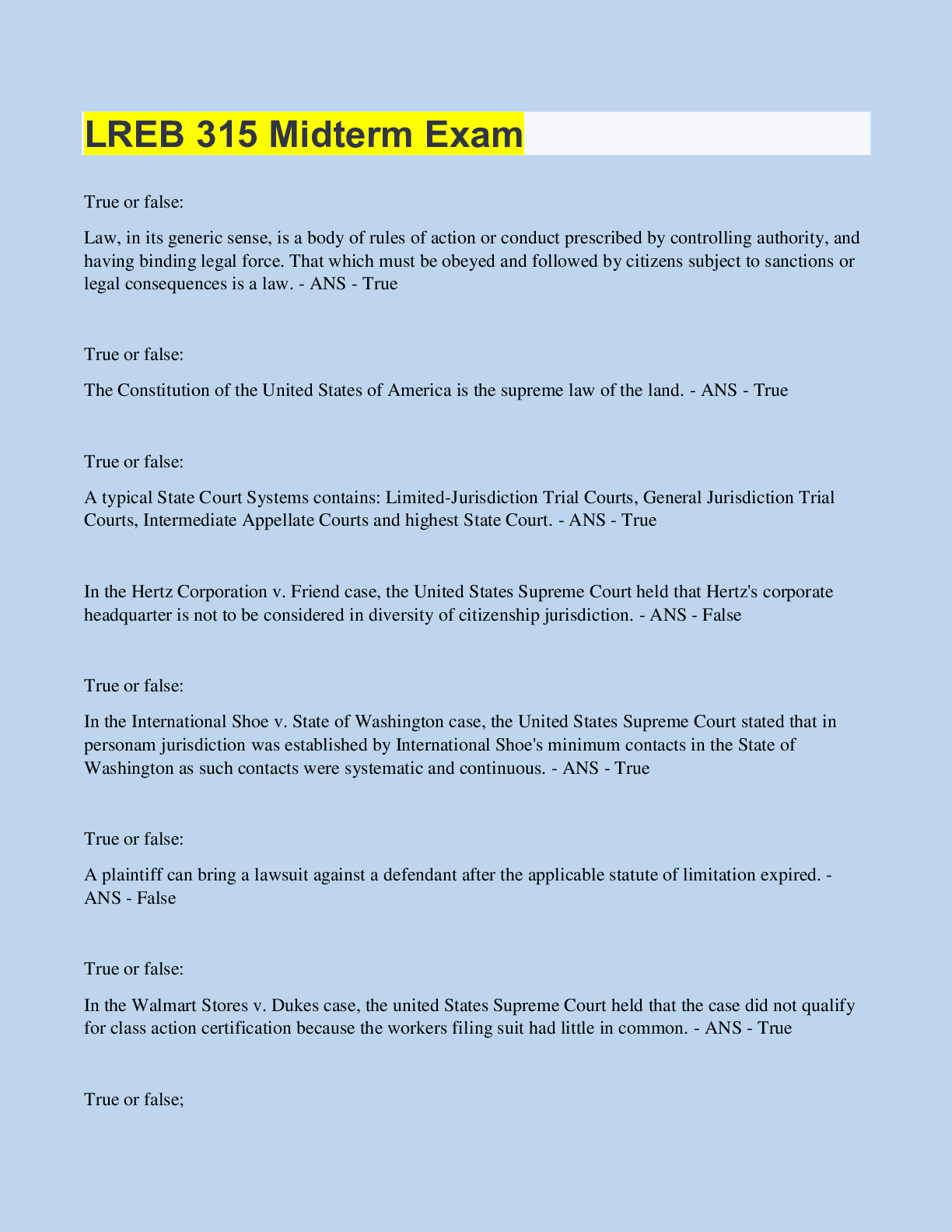
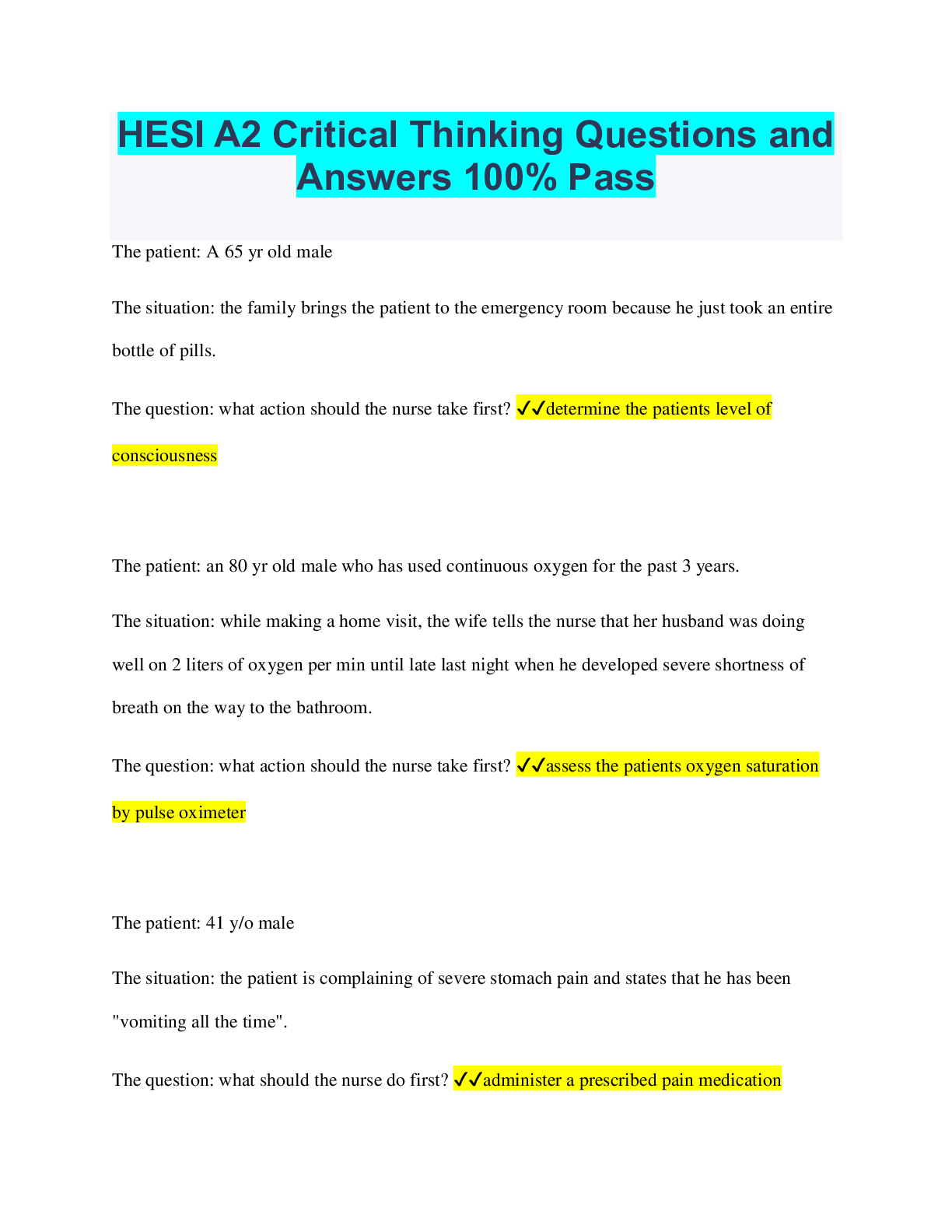



 2022 with Questions and Answers.png)

.png)
.png)
.png)
.png)



